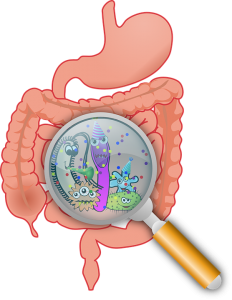Georgianna Donadio, MSc, DC, PhD

The single most reported complaints in all hospital emergency rooms are related to digestive system disorders. The digestive system is the most “stress affected” system in the human body and a big topic in our accredited health program. According to the Drug Topics News Magazine for Pharmacists (October, 2008) in 2008, Americans spent 5 billion dollars on over-the-counter digestive or “stomach” remedies.
It Starts With Education
Wouldn’t it be helpful to understand and educate others on how and why they are suffering from digestive ailments? In the accredited health program, we all know people who eat organic, natural food and are meticulous about the quality and quantity of what they put in their body and yet are sick, tired and plagued with health issues. Then there are others who eat anything and everything, the good, the bad and the ugly, and have energy to burn, not a pimple on their entire body and feel great.
Often, this is the result of the function and efficiency of their individual nervous systems. Those who have an active “sympathetic” nervous system, with the tenth cranial nerve wreaking havoc with their alimentary canal then to struggle. These are the folks that no matter what they eat and how much pure or clean organic food they consume – they just don’t do well and feel unwell much of the time.
For the individual with a well-tuned central nervous system, the digestive system can be a culinary playground that accepts all types of nutrients and food stuffs and produces ample nutrition without upset or illness.
 What makes one nervous system different from another, one person’s experience different from another? It has more to do with the unconscious personality of an individual than any other single factor, with the exception of the rare congenital or pathological occurrence.
What makes one nervous system different from another, one person’s experience different from another? It has more to do with the unconscious personality of an individual than any other single factor, with the exception of the rare congenital or pathological occurrence.
Demystifying The Nervous System
Just as our machines need electricity to operate, so do our internal organs and cells require electrical impulse to function and operate as well. The degree to which our nervous system is balanced and well-functioning – or not – is the degree to which we are healthy and able to function at maximum capacity in the world. As discussed in our accredited health programs, many healing arts such as acupuncture, yoga postures, meditation, chiropractic, breathing techniques, biofeedback, hypnosis, EMDR and other healing modalities attempt to restore balance to the nervous system as the pathway to improving internal and external bodily function. These methods address the cause of the presenting condition and not just treat the pain or symptom of the bodily malfunction.
Looking more closely at the digestive system and its intimate relationship with the immune system and the nervous system, we can easily follow the pathway of how brain function and the nervous system can create a “whole body” systemic cascade of bodily reactions which overtime lead to chronic illness and disease.
Bringing Stress Into The Mix
Our nervous systems are impacted by stressors; however, stress is not limited to just emotional stress as many believe. Stress includes poor nutrition, inadequate sleep, infection, excess exertion, surgery, trauma and reproduction. When our stresses or anxiety cause our brain to send biochemical messages to our cranial nerves, our digestive systems can be functionally affected. The anxiety and stress decrease our digestive and immune system functions.
The effect of a stressor on the body in the short term can be readily overcome by a healthy, adaptive nervous system. It is the longer-term stress, the chronic ongoing conditions and issues that place wear and tear on our nervous systems and organs and it is this friction or wear and tear that leads to chronic illness.
By understanding the intimate dance of our body’s organs and systems and how to maintain a balanced, healthy nervous system, we can avoid illness and chronic disease and live long, productive and disease-free lives!
For more information on Whole Health Living, consider visiting the National Institute of Whole Health. This nationally accredited program provides comprehensive, evidence-based Whole Health training for Patient Advocates, Whole Health Educators, and more.





